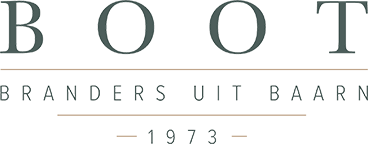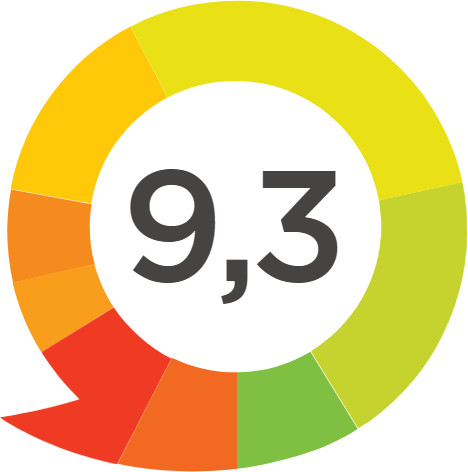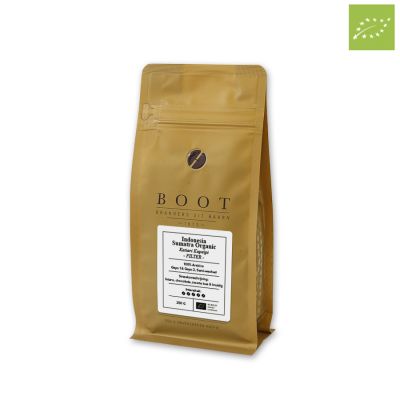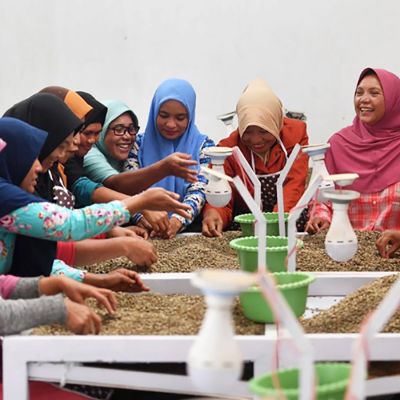- Free shipping in NL from €45
- Order before 12 PM, shipped same business day
- International shipping

Coffee Trip Sumatra - No Coffee - No Story
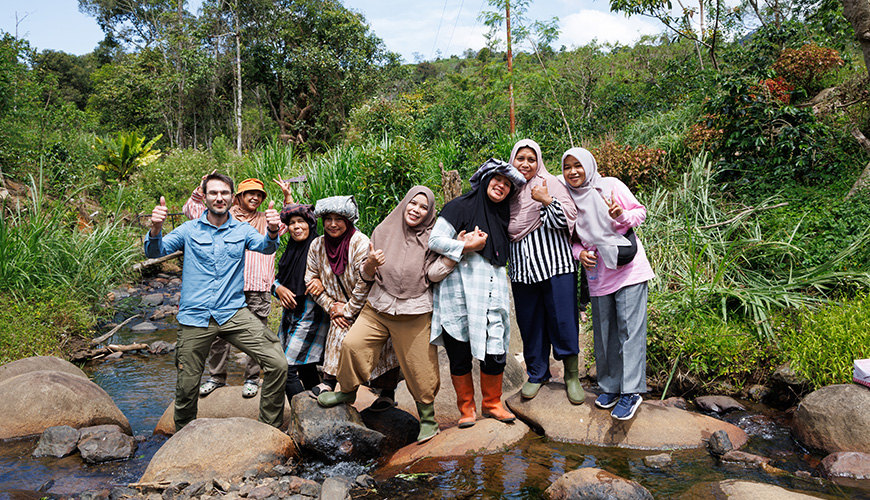
Rick and Esther visited Kopepi Ketiara in Takengon, Sumatra. Sumatra is Indonesia's largest island. An island with a whimsical history and enormous natural wealth ranging from mountain scenery, volcanoes, swamps and rainforests to waterfalls and lakes. Almost the entire island is Islamic, with strict Islamic sharia law in Aceh province.
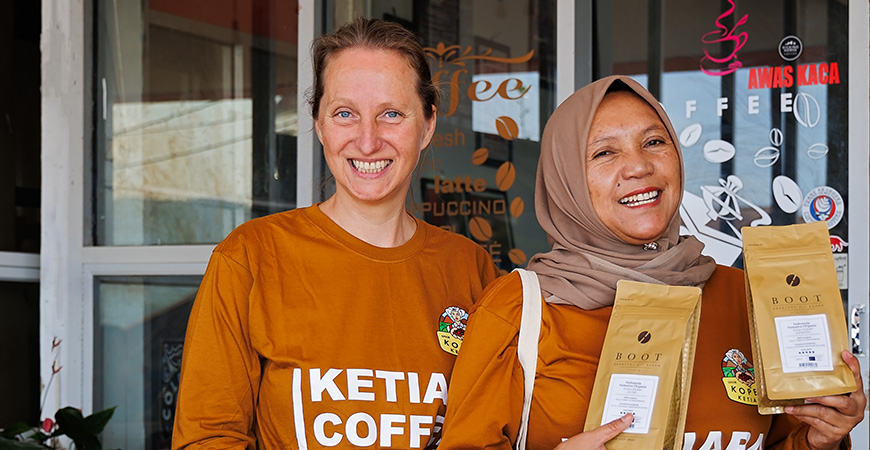
Photo: Esther together with chairwoman Rahmah
Ketiara cooperative was founded in 2008 by chairwoman Rahmah, which is unusual in Medan. There are about 1100 cooperative members, 70% of whom are female.
Ketiara has earned a well-deserved reputation as a producer of excellent Fairtrade and organic coffee. Rahmah encourages members by paying them well above the market price, but also by creating community programs that encourage farmers to remain members All coffees grown are certified. The money the coffee farmers receive extra through the Fairtrade Premium bonus on their coffee goes directly to projects that support the local community. Gender equality is very important here. BOOT Coffee buys coffee from the Hutan project. This project was developed in cooperation with Ketiara and DRWakefield to finance forest protection in Sumatra. We then pay, on top of the standard agreed coffee price, a premium fee. And with this amount raised, they help the coffee farmers modernize and improve. One example is the construction of concrete paths for transporting the coffee. So they no longer have to walk with large baskets on the steep and sandy paths. Investment in maintenance or purchase of equipment can also be financed through this fee.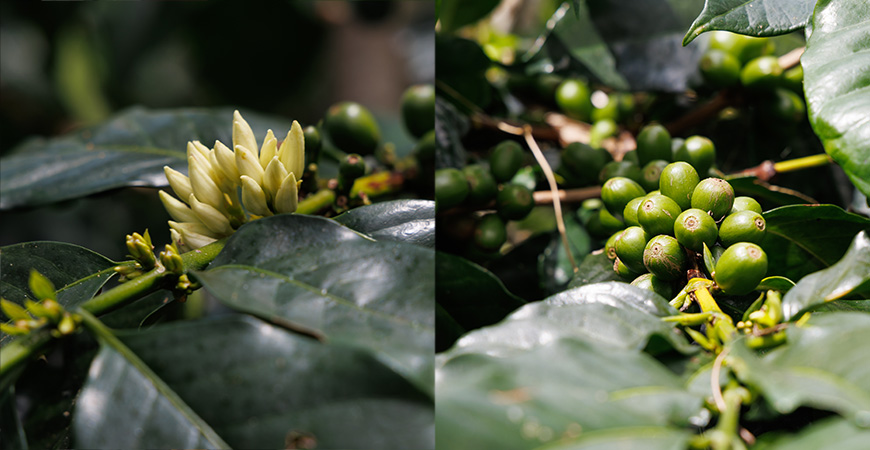
Photo: Green coffee blossoms and berries before harvest time
We are guests even before harvest time. Work continues throughout the year. An occasional blossom and some green berries are showing on the bushes. These are now pruned at the top so that the sun can slowly warm and ripen the coffee berries. Before the rainy season begins, the desire is to be able to harvest them all red. Today, due to climate change, it is difficult to determine when this season will kick in. Singing takes care of everything in this coffee forest. They are convinced that the musical sounds are absorbed by the coffee berries. The shade trees and plants present also get all the attention. Shade is important for the coffee bushes. The plantations have been in the family for generations and cannot expand. Trees that are too old are immediately replaced with new trees that preferably also yield something, while maintaining biodiversity. Banana plants, orange and avocado trees, cinnamon, jackfruit and sereh can be found here. Not only for the purpose of shade, but these also provide additional income. Fruits are sold in local markets. They also attract birds. These eat (harmful) insects and the droppings in turn provide fertilization of the soil.
This coffee journey also shows the rough edge of life in the Gayo Mountains and Sumatra. We think this should also be named. The average Sumatran resident is still struggling. Waste is not picked up by collection services. Garbage is still mostly burned directly, often on the roadside. At Ketiara, because of the good income for both coffee and extras, there are more opportunities. Children can get a (university) education through a scholarship, there are workshops for making organic fertilizer, maintenance of equipment and there is attention for the next generation of coffee farmers. The environment is a big challenge for everyone, but we all use our environment. To make positive changes, it is necessary for a large group of people to get and stay involved.
This trip showed again that coffee is more than just a product. It is warm, welcoming and changes people's lives.
Terima kasih!
With a coffee greeting from Esther and Rick
Indonesia Sumatra Organic
Indonesia Sumatra Ketiara Organic Espresso
Intense, chocolate, blackcurrant & spicy
-
Horecava - Jan. 13 to 16 - RAI Amsterdam Jan 9, 2025
-
Cold autumn days, warm up with good coffee Nov 13, 2024
-
Vacancy Trainer Workshops Nov 12, 2024
- horecava
- rai
- coffee concepts
- sca national coffee competitions
- cup probes
- barend
- boat
- latte art
- dutch brewers cup
- panama kotowa duncan
- filter coffee recipe
- hario switch
- 2025
- coffee
- state
- hospitality
- entrepreneur
- Specialty Coffee Association
- SCA
- Coffee Concepts
- arabica
- quality
- flavor
- autumn
- intense
- java
- indonesia
- espresso
- warm tastes
- coffee experience
- speculoos show
- coffee autumn
- specialty coffee
- coffee moment
- coffee enjoyment
- artisanal coffee
- coffee inspiration
- boat coffee
- barista trainer
- coffee professional
- give workshops
- coffee tasting
- Boot Koffie
- Amersfoort
- sustainable coffee
- hospitality support
- passion for coffee
- geisha
- gesha
- coffee type
- ethiopia
- panama
- colombia
- willemboot
- famous
- Ethiopian coffee
- panamanian coffee
- gesha origin
- coffee auctions
- hacienda la esmeralda
- quality coffee
- coffee designation
- Colombia La Laguna Geisha Organic - Limited Edition
- live
- roasting
- samples
- tasting
- burn
- cupping
- baarn
- store
- barista
- limited
- amersfoort
- local
- the classroom
- birdsong
- hartmann
- October
- araceli
- coffee of the month
- flat white
- brazil
- brazilian
- fazenda
- sao
- francisco
- bela
- vista
- coffee journey
- rick
- buyer
- drought
- price
- win
- jura
- stanley
- ktc
- happiness
- win
- espresso machine
- winners
- won
- discount
- organic
- filter
- pezzetti
- espresso jug
- filter coffee
- aeropress
- processing
- processing methods
- unwashed
- natural
- sustainable
- washed taste tones
- semi-washed
- washed
- honey
- processed
- blog
- kachalu
- decaf
- decaffeinated
- coffee farmer
- recepet
- instructions
- alejandro
- stable press
- team
- trainer
- business
- edition
- mesh
- premium
- caturra
- maragogype
- sumatra
- kopepi ketiara medan
- fair trade coffee sumatra
- organic coffee
- ketiara coffee cooperative
- hutan project sumatra
- sustainable coffee production
- esther
- indonesia
- blawan
- jampit
- shopping
- especially
- trial day
- organic
- home barista
- happinessflavor
- barendboot
- owner
- bio
- demonstration
- summer
- 84+
- grinding degree
- iced coffee
- panamaria
- koyner
- bunnik
- field kitchen
- food
- drink
- location
- bakery
- vegetable garden
- harvest table
- eko
- blend
- full body
- guts
- municipality
- ondernemen
- durable
- markroell
- mayor
- eemland
- nmvh
- dutch
- society
- industry
- trade
- Espresso
- Filter
- Panama
- coffee plantation
- acf
- amsterdam
- coffee
- festival
- acf2023
- event
- stock exchange
- gas plant
- westgas
- brazil
- coffee grinder
- ratio
- lead time
- month
- santos
- brasil
- times
- vincent
- van dijk
- representative
- resale
- stores
- ricardo
- boquete
- panamese coffee
- rickmaas
- kotowa
- grow
- dry
- select
- trip
- cooperativa
- caficultores
- santander
- rainforrest
- alliance
- tuyettran
- togo
- cups
- wecup
- waste
- litter-free
- re-use
- throwdown
- latte
- art
- milking
- February
- darja
- sexton
- director
- ethiopia
- odin
- organic
- magazine
- interview
- sommelier
- origin
- personal
- exotic
- taste profiles
- experience
- story
- Flavors
- trendy
- trends
- coffee trends
- green
- begin
- 2024
- coffee-of-the-month
- pacamara
- yeast
- yeast
- fermentation
- donjuan
- juan
- fermentation method
- agronomic
- family
- plantation
- administration
- webshop
- lungo
- Indonesia
- Sumatra
- Intense
- Women
- 50
- year
- reunion
- reunion
- the golden coffee box
- employees
- sinterklaas
- December
- piet
- poem
- ode
- spicy
- highly recommended
- nose
- burners
- roastery
- cupping
- perfection
- specialty
- finquita
- shiva
- not
- coffee roaster
- burner
- professional
- manager
- warehouse
- roast
- pro
- skal
- darkroast
- mystery
- smoky
- arnout
- decaffeinated
- quick
- quickmill
- machine day
- machine
- 820
- put
- employee
- store manager
- joukevink
- jouke
- finch
- lovebebber
- passion
- craft
- 50 years
- anniversary
- party
- coffee shop
- action
- quick mill
- hello
- dennis
- from
- will
- events
- account manager
- sales
- sales division
- office
- true
- brazil
- exciting
- travel
- lennard
- woerig
- elwaydesigns
- webdesign
- marketing
- designer
- enthusiast
- boat coffee game
- winner
- specialtycoffee
- Ethiopia
- AeroPress
- Hand Mill
- Outdoor Living
- Filter Coffee
- koffievdmonth
- coffees
- change
- coffee price
- increase
- Fair
- CO2
- costs
- radio
- m
- utrecht
- momoto
- wine
- whiskey
- litchi
- show
- dekoffeeshow
- music
- stories
- experienced
- vocals
- tell
- corazon
- dirkjan
- article
- gooieemlander
- present
- past
- future
- duration case
- goldencoffeebox
- avenue street
- baarnschecourant
- misset
- restaurant
- catering kitchen
- serve coffee
- cooking and cooking techniques
- boat coffee
- capriole
- chocolate
- coffee roasting
- move
- coffee production
- Brazil
- Mantiqueira de Minas
- quantity
- Brazil Santos
- Boat
- top
- two
- coffee dinner
- theLocal
- café
- denhaag
- capsules
- cups
- nespresso
- cup
- nice
- enjoy
- coffee brewing
- ultra
- heirlloom
- panama birdsong
- coffee bushes
- rainforest
- finca hartmann
- best of panama
- misset catering price
- recipe
- cereal drink
- coffee capsules
- coffee substitute
- deforestation
- climate neutral
- caffeine
- decaf
- natural
- certified
- tamp
- baristas
- profession
- box
- master
- moccamaster
- coffee game
- announcement
- filter machine
- tableware
- filters
- cafe
- dirk-jan
- leather
- bestofpanama
- ratibor
- tessie
- winner
- price
- award
- taste
- CSR
- futureproof
- collective
- rainforest
- discount
- action
- actions
- actions
- bonus
- affordable
- prices
- sunshine
- tastiest
- most beautiful
- mexico
- AMS
- climate
- neutral
- press release
- emissions
- carbon
- footprint
- environmental impact
- climate impact
- CO2
- acf2022
- cabra
- yemen
- gourmet
- corona
- conditions
- web store
- order
- Buy
- covid19
- Opened
- changes
- coffee farmers
- price increase
- fairtrade
- amsterdome
- theather
- dragan
- bakema
- draganbakema
- nk blind tests
- soesterberg
- fanciers
- sommeliers
- Kontakt der Kontinenten
- fred nijhuis
- cooperative
- discovered
- kaldi
- legends
- fruits
- monks
- mocha
- qahwa
- coffee shops
- July
- harvest
- new
- organic
- soccer
- uk
- elf
- cold drip
- ride
- bicycle tour
- bunschoten
- scuderia
- lamarzocco
- marzocco
- coffee bean
- life
- sustainability
- coffee grounds
- scrub
- compost
- hands
- her
- skin
- odors
- recycle
- entrepreneurs
- actor
- coffee happiness
- sponsor
- sponsorship
- convenience
- tips
- brewing tips
- milk
- foaming
- Froth
- latte-art
- home
- video
- beginner
- hearts
- flowers
- advanced
- cafetiere
- push pot
- frenchpress
- slowcoffee
- grinding
- brewing instructions
- save
- coffee storage
- how long
- organic coffee
- store brewed coffee
- panamanian
- single estate
- happiness by taste
- trialand-er
- maria
- ruiz
- michiel
- slaats
- coffee song
- smell the bush
- test different
- piano
- trumpet
- milk frother
- Brazil
- Nicaragua
- Ethiopia
- espresso coffee
- pananama
- Tea types
- cocoa
- ktc35
- coffee for peace
- epsresso
- cold
- brew
- coldbrew
- ice
- beverage
- serving tip
- cocktail
- espressions
- work
- manual-filter-coffee-making
- sachets
- ese
- serving
- pads
- fantastic
- fiter
- make the best coffee
- Workshops
- tastings
- temperature
- amount
- warming up
- Amsterdam Coffee Festival
- Is coffee healthy
- is coffee good for you
- how healthy is coffee
- how many cups of coffee per day
- is decaffeinated coffee healthier
- is filter coffee healthier than espresso
- beans
- coffee countries
- countries
- healthy
- cafetière
- scoops
- healthier
- support
- local
- coffeetogo
- the price ofmycoffee
- book
- fair price
- fair coffee
- mission
- acf2020
- socialimpact
- percolator
- coffee cup
- coffee pod
- piston
- sustainablecoffee
- what's the money in coffee
- sustainablecoffee
- did you know
- whatyouneed to know aboutcoffee
- crowdaboutnow
- crowdfunding
- threatened
- low
- revenue
- wedding
- prizewinner
- missethoreca
- finca
- coffee cocoa
- hotspot
- coffee room
- vegan
- conscious
- delights
- smoothies
- acai
- heleenvanroyen
- heleen
- royen
- coffee diary
- coffee school
- hilversum
- plant
- berries
- coffee plant
- harvest
- launch
- coffee orders
- buy coffee beans
- npo3
- inspection service
- inspection of value
- marin frank
- barend boot
- July 11
- TV
- broadcast
- visit
- prideofthailand
- thailand
- thai
- coffee prices
- costa rica
- guatemala
- el Salvador
- honduras
- nicaragua
- fair trade
- middle america
- south america
- conversation
- nk
- blind tests
- fd


